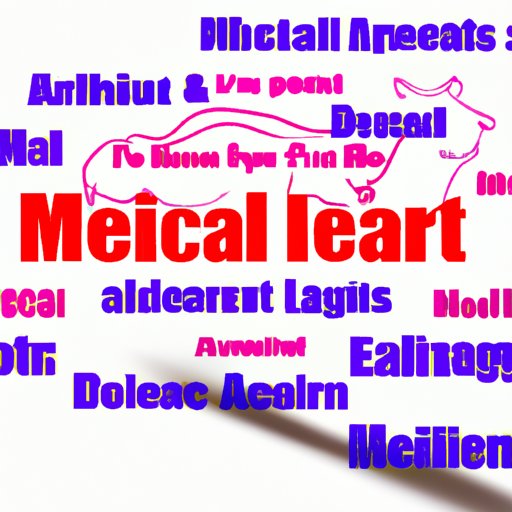Introduction
An all-meat diet is one that consists solely of meat, such as beef, pork, poultry, and fish. This type of diet has become increasingly popular in recent years, with some people opting to follow it for weight loss, health benefits, or simply because they enjoy the taste of meat. But is an all-meat diet really healthy? In this article, we’ll explore the pros and cons of an all-meat diet to help you decide if it’s right for you.
Examining the Pros of an All-Meat Diet
There are a few potential benefits to following an all-meat diet. Let’s take a look at each one in more detail.
Health Benefits
Some research suggests that a high-protein diet like an all-meat diet may have certain health benefits. A study published in The American Journal of Clinical Nutrition found that a high-protein diet was linked to a lower risk of heart disease and stroke. Additionally, a review of studies published in the International Journal of Environmental Research and Public Health concluded that a high-protein diet may reduce levels of “bad” LDL cholesterol and triglycerides, both of which are risk factors for heart disease.
Weight Loss Potential
Another potential benefit of an all-meat diet is its ability to help you lose weight. A study published in the journal Nutrients found that participants who followed a high-protein diet lost significantly more weight than those who followed a low-protein diet. Additionally, a review of studies published in the journal Obesity Reviews concluded that a high-protein diet may help reduce body fat and maintain muscle mass during weight loss.
Variety of Foods Available
Finally, an all-meat diet offers a wide variety of foods to choose from. You can enjoy everything from steak and pork chops to burgers and sausages. Plus, there are many different types of meat available, including beef, pork, poultry, and fish, so you won’t get bored with your meals.

Exploring the Health Effects of Eating Only Meat
While there are some potential benefits to an all-meat diet, there are also some potential health risks. Let’s take a closer look at the nutritional value of meats and the potential for nutrient deficiencies.
Nutritional Value of Meats
Meats are a good source of protein and other important nutrients, such as iron, zinc, and B vitamins. However, they are also high in saturated fat and cholesterol, which can increase your risk of heart disease if consumed in excess. Additionally, most meats are low in fiber, which is important for digestion and overall health.
Potential for Nutrient Deficiencies
Eating only meat can also lead to nutrient deficiencies. Since meats are low in fiber, vitamins, and minerals, you may not be getting enough of these essential nutrients if you’re only eating meat. Additionally, a study published in the American Journal of Clinical Nutrition found that people who followed a low-carbohydrate (less than 20 grams per day) and high-protein (greater than 25 percent of total calories) diet had lower levels of vitamins A, E, and C than those who ate a higher-carbohydrate diet.
Comparing Different Types of Meat for a Healthy Diet
When considering an all-meat diet, it’s important to choose the right types of meat. Let’s examine the differences between red and white meats, as well as processed and unprocessed meats.
Red vs. White Meats
Red meats, such as beef, lamb, and pork, are higher in saturated fat and cholesterol than white meats, such as chicken, turkey, and fish. Therefore, it’s best to opt for leaner cuts of red meat and to limit your consumption of processed meats, such as bacon and sausage.
Processed vs. Unprocessed Meats
Processed meats, such as bacon, hot dogs, and deli meats, are often higher in sodium, fat, and preservatives than unprocessed meats. Therefore, it’s best to limit your consumption of processed meats and opt for fresh, unprocessed meats instead.
Investigating the Nutritional Benefits of an All-Meat Diet
Despite the potential risks of an all-meat diet, there are some nutritional benefits as well. Let’s take a look at the protein content and vitamin and mineral content of meats.
Protein Content
Meats are a good source of protein, which is essential for building and maintaining muscle mass. A 3-ounce serving of beef, for example, contains about 22 grams of protein. This is equivalent to about four large eggs or two cups of cooked oatmeal.
Vitamin and Mineral Content
Meats are also a good source of several vitamins and minerals, including iron, zinc, and B vitamins. Beef, for example, is an excellent source of iron and zinc, while chicken is a good source of niacin and vitamin B6. Additionally, fish is a good source of omega-3 fatty acids, which are important for heart health.
Considering the Potential Risks of an All-Meat Diet
While there are some potential benefits to an all-meat diet, there are also some potential risks. Here’s what you need to know.
High Fat and Cholesterol
Meats are high in saturated fat and cholesterol, which can increase your risk of heart disease if consumed in excess. Additionally, processed meats, such as bacon and sausage, are often high in sodium, fat, and preservatives, which can further increase your risk of health complications.
Low Fiber Intake
Since meats are low in fiber, you may not be getting enough of this important nutrient if you’re only eating meat. Additionally, a lack of fiber can lead to constipation and other digestive issues.
Increased Risk of Certain Diseases
Research suggests that a high-protein diet like an all-meat diet may increase your risk of certain diseases. A study published in the journal BMJ Open found that a high-protein diet was linked to an increased risk of type 2 diabetes. Additionally, a review of studies published in the journal Advances in Nutrition concluded that diets high in animal proteins may increase your risk of certain cancers.
Evaluating the Long-Term Impact of an All-Meat Diet
In addition to the potential health risks, there are also some potential long-term impacts of an all-meat diet that you should consider. Let’s take a look at two of the most important ones.
Sustainability Issues
Eating only meat can have a negative impact on the environment. Livestock production is one of the leading causes of greenhouse gas emissions and deforestation. Additionally, the overconsumption of meat can lead to water pollution and land degradation.
Health Complications
Finally, an all-meat diet may lead to health complications in the long term. A study published in the journal JAMA Internal Medicine found that people who followed a low-carbohydrate and high-protein diet were more likely to die of any cause than those who followed a balanced diet. Additionally, a review of studies published in the journal Advances in Nutrition concluded that high-protein diets may increase your risk of kidney disease, osteoporosis, and other chronic conditions.
Analyzing the Popularity of an All-Meat Diet
Despite the potential risks and long-term impacts, an all-meat diet is still popular among many people. Let’s take a look at why it’s so popular and some potential drawbacks.
Reasons for its Popularity
One reason for the popularity of an all-meat diet is its potential for weight loss. As mentioned earlier, a high-protein diet can help you lose weight and maintain muscle mass. Additionally, some people find that an all-meat diet is convenient and easy to follow, since there are a variety of meats available.
Potential Drawbacks
However, there are also some potential drawbacks to an all-meat diet. For one, it can be expensive, since meats are typically more expensive than other types of food. Additionally, it can be difficult to get enough fiber, vitamins, and minerals if you’re only eating meat. Finally, it may not be sustainable in the long run due to environmental concerns.
Conclusion
An all-meat diet can offer some potential benefits, such as weight loss and improved heart health. However, it can also lead to nutrient deficiencies and increased risk of certain diseases. Additionally, it can have a negative impact on the environment and may not be sustainable in the long run. Therefore, it’s important to weigh the pros and cons carefully before deciding if an all-meat diet is right for you.
(Note: Is this article not meeting your expectations? Do you have knowledge or insights to share? Unlock new opportunities and expand your reach by joining our authors team. Click Registration to join us and share your expertise with our readers.)
